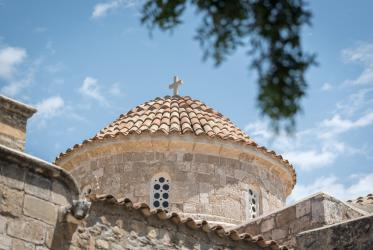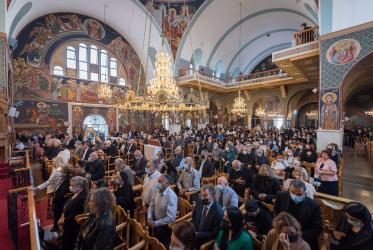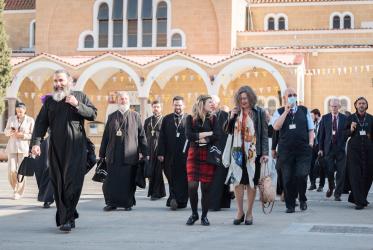Outline for the working agenda of the Special Commission on Orthodox Participation in the WCC
Morges, Switzerland, December, 1999
The Special Commission, in beginning its work, was assisted by the introductory comments of His Holiness Aram I, moderator of the Central Committee, and Dr Konrad Raiser, general secretary of the WCC. Their points provided a helpful framework for undertaking our work.
The Commission reviewed background materials including all important statements and reports of conferences regarding Orthodox participation in the WCC throughout its history, beginning with the Toronto Statement in 1950. These documents will serve as a resource to the Commission and its subcommittees.
The Commission recalled that our churches have stayed together in fellowship over the past decades, and that we hope to "grow together", in the words of the Harare assembly, as we look to the future.
A steering committee was formed to suggest proposals for carrying out the mandate given by the Harare assembly. The work of the Special Commission would be carried out by four subcommittees organized around the following working agenda:
1. Organization of the WCC
Possible issues:
- Should membership be based on individual member churches or another model?
- How should the Orthodox churches be fairly represented in governing bodies, and by what criteria?
- By what means and method should we make decisions in our governing bodies?
This subcommittee will take full account of the material in Section 1 of the "Preliminary Orthodox Proposals".
2. The style and ethos of our life together in the WCC
Possible issues:
- What is the meaning of staying together in prayer, worship and discernment of the will of God?
- How do we open space in our institutional life for sharing freely and fully our theological and ethical convictions with one another?
- By what means do we select, approve, monitor and own the agenda for the WCC's programmes, activities and concerns?
This sub-committee will take full account of the material in Section 2, paragraph d of the "Preliminary Orthodox Proposals".
3. Theological convergences and differences between Orthodox and other traditions in the WCC
Possible issues:
- How do we constructively explore the depth of serious theological and historical differences, as well as successful mutual understandings, between the Orthodox and other traditions in the WCC?
- How can we better describe to one another our different theological approaches on fundamental issues, such as baptism as an element of belonging to the church, in ways which build understanding and deepen our fellowship?
- Can we describe our differing theological approaches to the social and ethical dimensions of our common faith?
- Can we find, through the Common Understanding and Vision of the WCC, a shared agenda of the challenges presently facing the ecumenical movement and the WCC?
This subcommittee will take full account of the material in Section 5 of the "Preliminary Orthodox Proposals".
4. Existing models and new proposals for a structural framework for the WCC
Possible issues:
- Can we take account of various proposals and ideas which are emerging for expressing ecumenical fellowship?
- What options are possible for the WCC to reconstruct its organizational framework?
- How might the various models of a "Forum" be considered in relationship to the structure of the WCC?
This subcommittee will take full account of the material in Parts 3 and 4 of the "Preliminary Orthodox Proposals".
It is suggested that initially, subcommittees 1 and 4 might meet at the same time and place in order to assure the careful coordination of their respective work.
Note: This process is guided and inspired by the Common Understanding and Vision of the World Council of Churches, as adopted by the eighth assembly. Further, the possible items for discussion in the Executive Committee's report from December 1998 should be taken into account within the framework of this working agenda and be fully integrated.
In order to deepen our ecumenical sharing in the present situation, the Commission will meet in Orthodox settings for its subcommittees and plenary session in the coming year. Further, the Commission requests WCC staff to give special attention to facilitating ecumenical encounters between Orthodox churches and other member churches in the WCC to undergird the work of the Commission.




